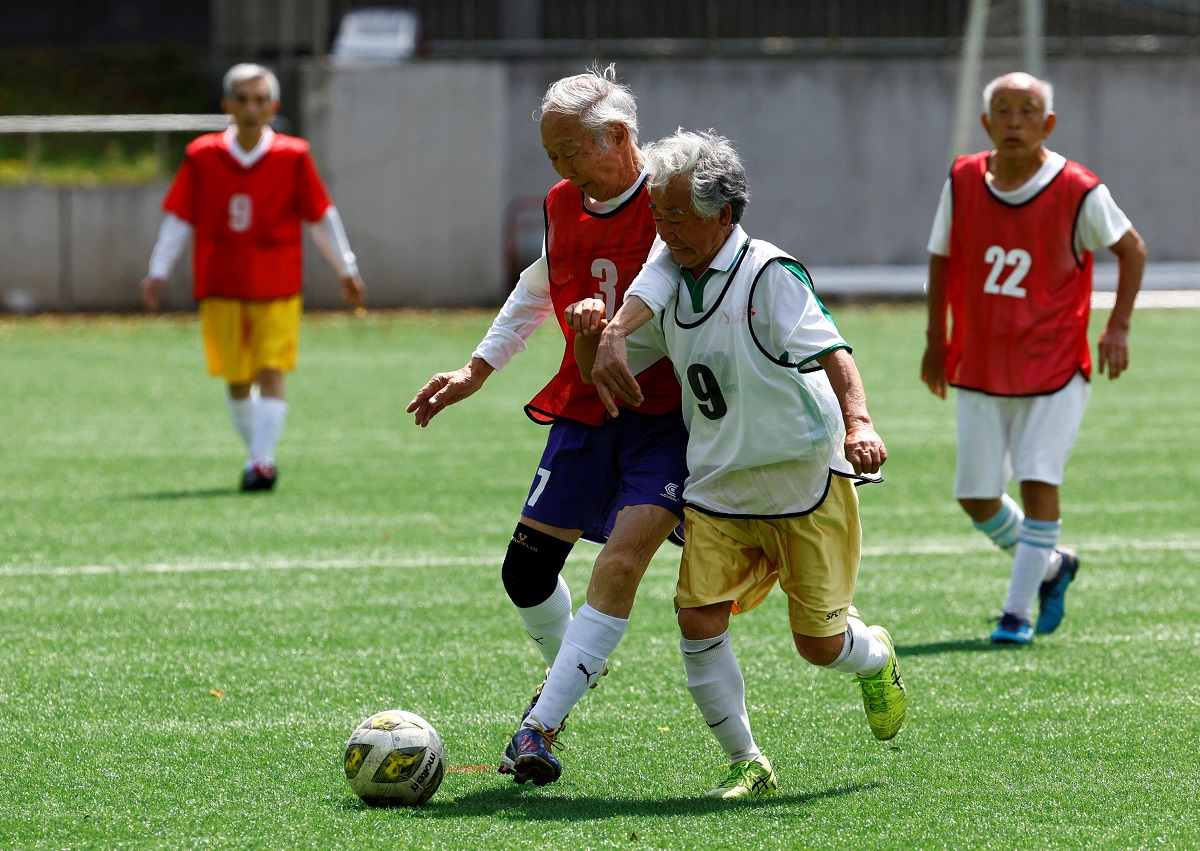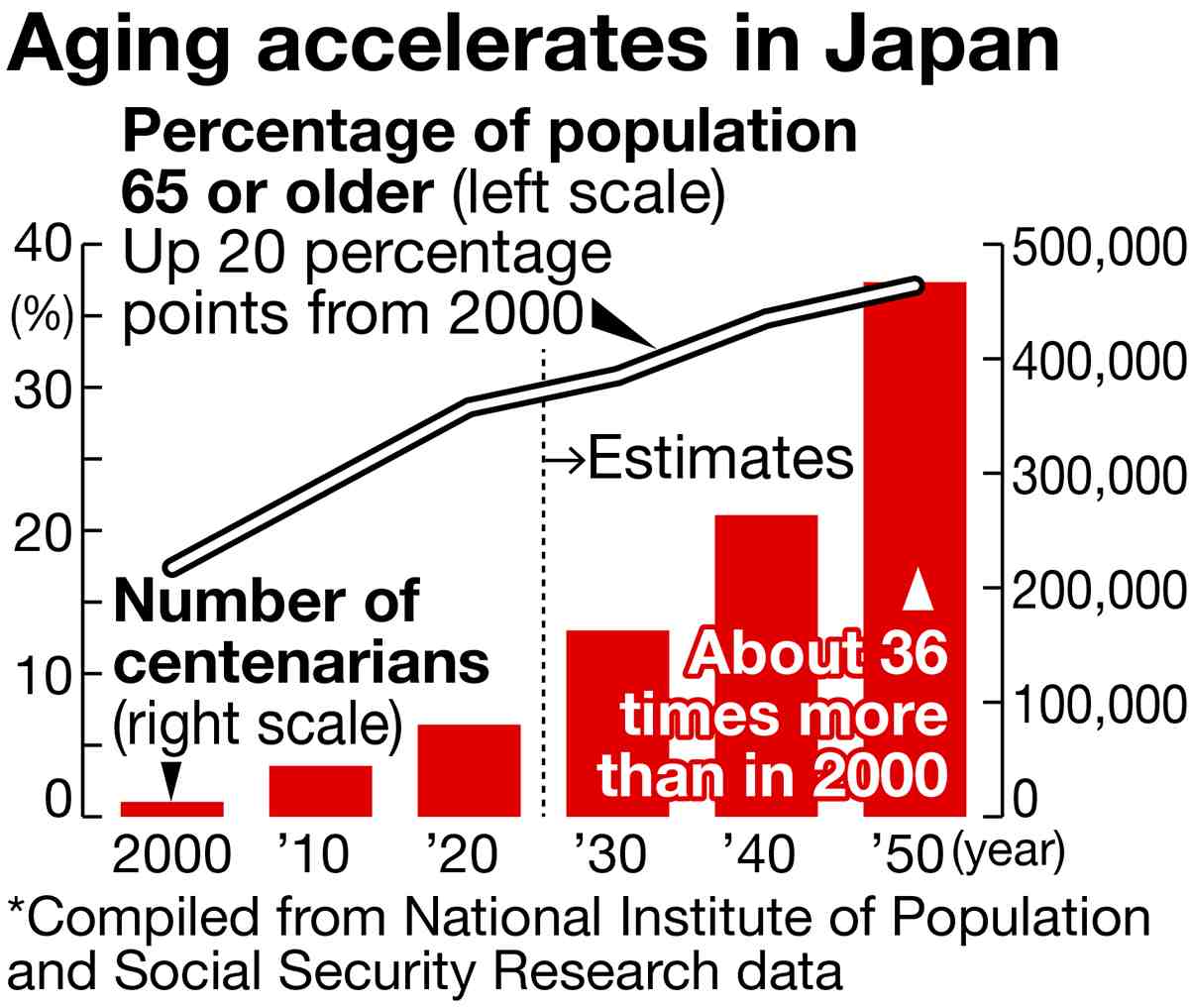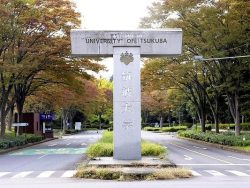Japan 2050: Changing Lifestyles / People in Super-Aging Japan Have Wide-Ranging Needs, From an Enzyme-Inhibiting Drug to a Sense of Purpose

The Wider Image: Takao Yokoyama (2nd to the left), 86, chases a ball against Kozo Ishida, 82, at the SFL (Soccer For Life) 80 League opening match in Tokyo, Japan, April 12, 2023.
The Yomiuri Shimbun
6:00 JST, July 2, 2024
This is the third and final installment in a series that explores what Japan will look like in 2050, how we as a nation will meet the challenges and what kind of society we want to have.
***
Japan is a super-aging society, a fact that has implications in fields ranging from biological research to labor practices to living arrangements.
Among those studying ways to promote healthy aging is Prof. Makoto Nakanishi at the Institute of Medical Science, University of Tokyo. He is working to develop technology by the year 2040 to eliminate senescent cells.
Senescent cells, which have stopped dividing, are considered a factor in age-related disorders. In recent years, it has become clear that senescent cells accumulate with age and have a negative impact on organs and locomotor system.
In 2021, Nakanishi discovered that a certain enzyme keeps senescent cells alive. When a drug that inhibits the function of the enzyme was tested on mice, rejuvenating effects were observed, such as recovery of muscle strength and improved organ function.
Nakanishi aims to achieve application of the drug in humans.
Nakanishi said: “It is possible that by around 2050, humans will be able to work until they are 100 years old and enjoy the rest of their lives until 120 years old.”
Takanori Miura, president of Tenro-in bookstore, says he is planning his life on the assumption he will live to 120. In addition to running his bookstore, he has been studying design and photography among other disciplines. He plans to focus on new businesses related to artificial intelligence and to be active as a photographer in the future. At around 90, he plans to be a writer.

The number of centenarians in Japan is expected to reach 470,000 by 2050, a fivefold increase from 2023.
“Centenarians are nothing special. I will make efforts to balance staying healthy and continuing to learn, to enjoy being part of a long-lived society,” Miura said.
According to an estimate by the National Institute of Population and Social Security Research, Japan’s aging rate ― the percentage of the population aged 65 and older ― will be 37% in 2050. This means there will be only 1.4 working-aged people (those aged 15 to 64) to support each elderly person, creating a “shoulder-riding” society.
Kana Takeda, a researcher at Nomura Research Institute, suggests realizing a society in which the working-age population is defined as 15 to 69 years old, raising the upper limit of the current age range by five years, so that the burden of providing for the elderly in 2050 will remain at the same level as in 2020.
“It is necessary to create an environment in which healthy elderly people can continue to be active in society,” Takeda said.
“The elderly are diamonds in the rough,” Shinjiro Ichikawa, said enthusiastically.
Ichikawa is the president of Yokobiki Shutter, a manufacturing company in Adachi Ward, Tokyo. Its workplace has 31 employees, 10 of whom are 65 or older. The company has practically no mandatory retirement age, and gives pay raises to employees even after they turn 60. New employees in their 70s are not rare at Yokobiki Shutter. The oldest employee is 81. He joined five years ago and now he is in charge of design. “No matter how old I get, I still enjoy doing new things,” he said with a smile.
Nobishiro House Kameino, a rental apartment building in Fujisawa, Kanagawa Prefecture, is currently home to two university students in their 20s and five elderly people in 70s and 80s living alone.
Young or old, when the residents of the apartment have problems, they discuss them with other residents via social media. The students replace lightbulbs or shovel snow for the elderly residents, who in return treat their young neighbors to tea and sweets.
It is estimated that 10.84 million elderly people will be living alone in 2050.
Sayo Ayukawa, 41, head of Nobishiro, the real estate agency that manages the apartments, said, “There is a need for housing where residents support each other like a family, regardless of generation.”
Nobuhiro Maeda, a senior researcher at the NLI Research Institute, proposes the concept of “duration of ability to contribute to society” as a new metric for a super-aging society. It refers to the time when people are connected to society by having roles in which they feel useful.
There are various ways to contribute to society, such as volunteering, taking care of grandchildren, donating money or simply being there for someone.
Maeda said: “Extending the duration of ability to contribute to society leads to good mental health and a sense of happiness for each person. In a society where people can enjoy living a long life, it should be easy to live and raise children. This should be the goal for Japan, which has a declining population.”
Most Read
Popular articles in the past 24 hours
-

Japan’s Lotteria Restaurant Operator Co. Changes Name, Will Rebra...
-

Revitalization of Shipbuilding Industry: Counter Chinese, S. Kore...
-

University of Tsukuba Faculty Member Posts Discriminatory Message...
-

Japan's Foreign Minister Says No Contact With China's Counterpart...
-

Osaka Expo Mascot Myaku-Myaku-Themed Cafe Opens in Osaka, Set to ...
-

Japanese Shares Dip as Soft Data, Post-Election Lull Cap Moves
-

Milano Cortina 2026: 500-Meter Bronze Gives Miho Takagi Drive For...
-

1st Overseas Suke-San Udon to Open in Taiwan; Company Aims for Mo...
Popular articles in the past week
-

Prudential Life Insurance Plans to Fully Compensate for Damages C...
-

Videos Plagiarized, Reposted with False Subtitles Claiming ‘Ryuky...
-

Woman with No Overseas Travel History Infected with Measles in Na...
-

Milano Cortina 2026: Kokomo Murase Comes Out on Top After Overcom...
-

CRA Leadership Election Will Center on Party Rebuilding; Lower Ho...
-

Tokyo’s New Record-Breaking Fountain Named ‘Tokyo Aqua Symphony’
-

Crime in Japan Ticks Up for 4th Straight Year
-

Japanese Constitutional Revision Debate Expected to be Revived Af...
Popular articles in the past month
-

Japan Institute to Use Domestic Commercial Optical Lattice Clock ...
-

Israeli Ambassador to Japan Speaks about Japan’s Role in the Reco...
-

Man Infected with Measles May Have Come in Contact with Many Peop...
-

China Eyes Rare Earth Foothold in Malaysia to Maintain Dominance,...
-

Prudential Life Insurance Plans to Fully Compensate for Damages C...
-

Woman with Measles Visited Hospital in Tokyo Multiple Times Befor...
-

Australian Woman Dies After Mishap on Ski Lift in Nagano Prefectu...
-

Foreign Snowboarder in Serious Condition After Hanging in Midair ...
Top Articles in Society
-

Man Infected with Measles May Have Come in Contact with Many People in Tokyo, Went to Store, Restaurant Around When Symptoms Emerged
-

Woman with Measles Visited Hospital in Tokyo Multiple Times Before Being Diagnosed with Disease
-

Australian Woman Dies After Mishap on Ski Lift in Nagano Prefecture
-

Foreign Snowboarder in Serious Condition After Hanging in Midair from Chairlift in Nagano Prefecture
-

Record-Breaking Snow Cripples Public Transport in Hokkaido; 7,000 People Stay Overnight at New Chitose Airport
JN ACCESS RANKING
-

Japan Institute to Use Domestic Commercial Optical Lattice Clock to Set Japan Standard Time
-

Israeli Ambassador to Japan Speaks about Japan’s Role in the Reconstruction of Gaza
-

Man Infected with Measles May Have Come in Contact with Many People in Tokyo, Went to Store, Restaurant Around When Symptoms Emerged
-

Prudential Life Insurance Plans to Fully Compensate for Damages Caused by Fraudulent Actions Without Waiting for Third-Party Committee Review
-

Woman with Measles Visited Hospital in Tokyo Multiple Times Before Being Diagnosed with Disease







